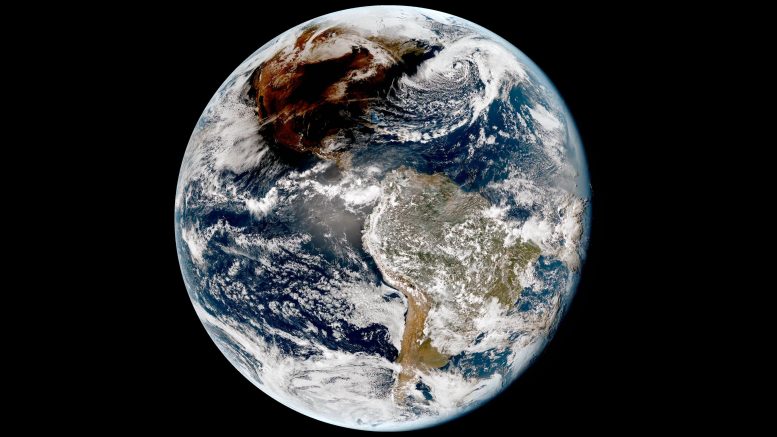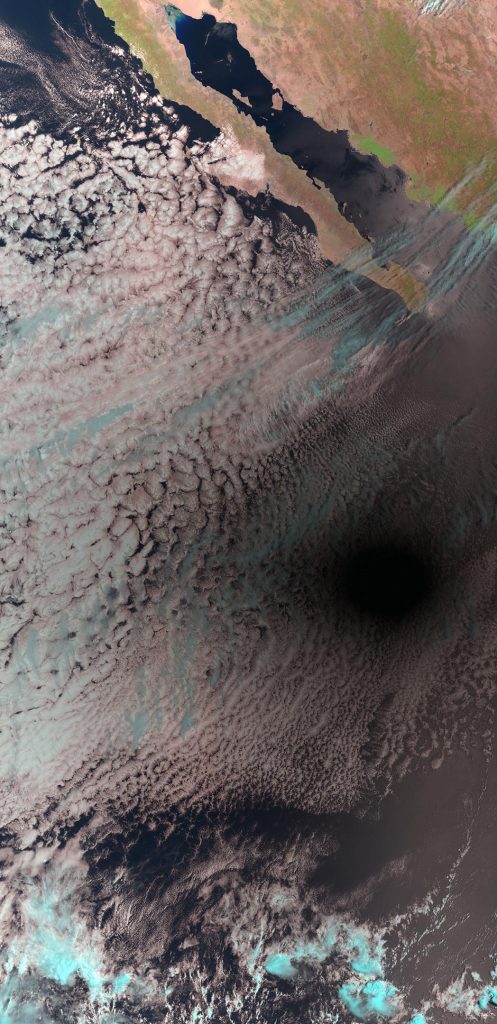
GOES-16 and Sentinel-3 satellites documented the April 8 solar eclipse across North America, exploring its impact on weather patterns. Credit: ESA, Data: NOAA
A total solar eclipse darkened parts of North America on April 8, with GOES-16 capturing the event, offering insights into atmospheric effects.
A total solar eclipse swept across North America on April 8, blocking out the Sun momentarily with parts of the continent plunged into darkness. Geostationary satellites orbiting 36,000 km (22,000 miles) away captured images of the rare celestial event.
These images, captured by the Geostationary Operational Environmental Satellite (GOES-16), captured the moon’s shadow moving across North America from approximately 10 a.m. to 5 p.m. EDT (16:00 to 23:00 CEST.)
A total solar eclipse occurs when the Moon passes between the Sun and Earth and, for a short period, blocks the face of the Sun, save for a visible ring of light, known as the Sun’s corona.
The track of the moon’s shadow across Earth’s surface, called the path of totality, spanned across the North American continent – from Mexico to the very eastern tip of Canada.
The GOES series is a collaborative development and acquisition effort between National Oceanic and Atmospheric Administration (NOAA) and NASA. The GOES-16 (GOES-East) satellite, the first of the series, provides continuous imagery and atmospheric measurements of Earth’s western hemisphere and monitors space weather.

A total solar eclipse swept across North America on April 8, blocking out the Sun momentarily with parts of the continent plunged into darkness. The Copernicus Sentinel-3 mission captured images of the eclipse with its Sea and Land Surface Temperature Radiometer (SLSTR). This image was acquired at 19:45 CEST (17:45 UTC). Credit: Contains modified Copernicus Sentinel data (2024), processed by ESA
The Copernicus Sentinel-3 mission also captured images of the eclipse (see above) with its Sea and Land Surface Temperature Radiometer (SLSTR).
The eclipse also acts as a laboratory for researching what happens to weather when the Moon’s shadow passes over. The shadow makes air temperatures drop and can cause clouds to evolve in different ways. Data from GOES, Sentinel-3, and other satellites are now being used to explore these effects.
https://news.google.com/rss/articles/CBMiXWh0dHBzOi8vc2NpdGVjaGRhaWx5LmNvbS9lY2xpcHNlLWluLW1vdGlvbi1kcmFtYXRpYy1zcGFjZS1mb290YWdlLW9mLXRoZS10b3RhbC1zb2xhci1lY2xpcHNlL9IBAA?oc=5
2024-04-12 07:08:19Z
CBMiXWh0dHBzOi8vc2NpdGVjaGRhaWx5LmNvbS9lY2xpcHNlLWluLW1vdGlvbi1kcmFtYXRpYy1zcGFjZS1mb290YWdlLW9mLXRoZS10b3RhbC1zb2xhci1lY2xpcHNlL9IBAA
Tidak ada komentar:
Posting Komentar